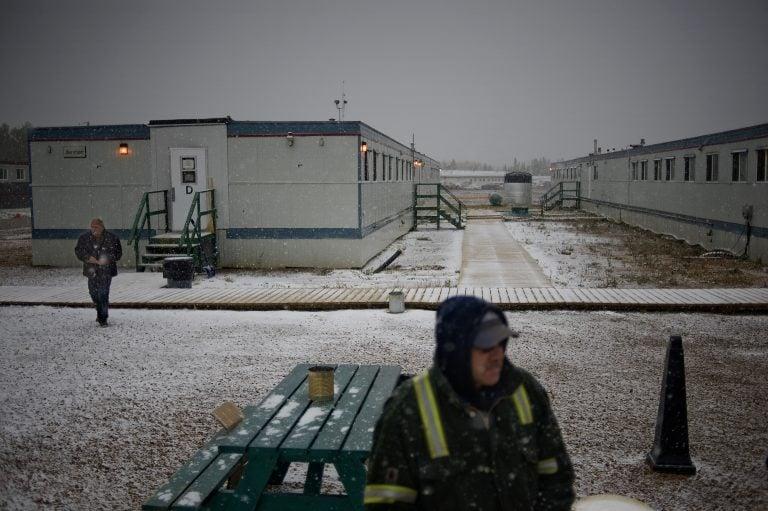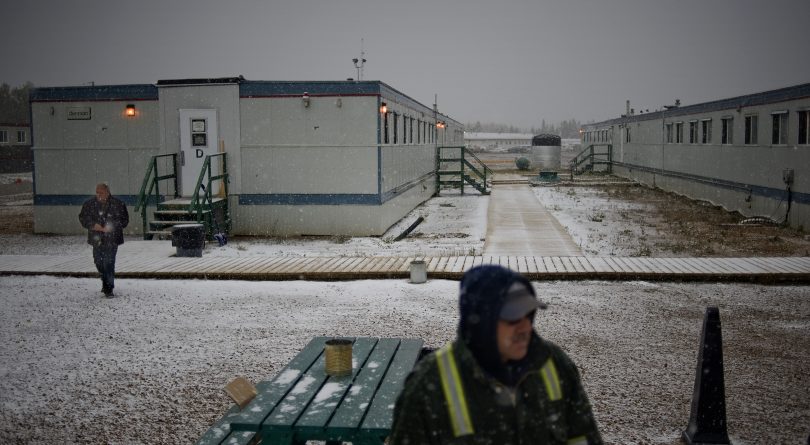Are ‘man camps’ that house pipeline construction workers a menace to Indigenous women?
While activists say a ‘hyper-masculine’ culture in remote work camps poses a threat to women in surrounding areas, others say the inflammatory ‘man camp’ accusation doesn’t reflect reality

The Eveready Worker Camp is one of the many worker camps that dot the landscape around the Oil Sands Developments. Some workers receive free lodging while others pay for the housing. They are given three meals a day, have an entertainment room and their own private rooms. Different camps offer different amenities and they can range in quality, expense and services that they offer. (Jon Lowenstein/NOOR/REDUX)
Share

In the multi-pronged fight over an expanded Trans Mountain pipeline, climate change, spill fears and Indigenous land rights have led the way. In the B.C. Interior, a grimmer allegation is on the table: that pipeline construction means rape of Indigenous women—and not in a metaphorical sense.
This threat would begin, the argument goes, before a single teaspoon of diluted bitumen courses through the proposed new pipeline, which Ottawa has agreed to take over from Kinder Morgan. To construct it through sparsely populated areas, any builder would do what resource companies have done for decades: erect work camps, hosting mostly young men. A pair of 550-bed facilities were planned near Clearwater and Blue River, small communities northeast of Kamloops, B.C. That’s in traditional Secwepemc territory, and some activists have adopted the Women’s Declaration Against Kinder Morgan Man Camps. It’s a gendered term Kanahus Manuel picked up at the Standing Rock protests in North Dakota, where the recent oil boom brought horror stories about drug problems and sexual violence around the pop-up worker enclaves and Indigenous reserves. “These man camps are the ones that are going to construct this evil pipeline, and those workers are going to bring in their rigging culture, their sex trade, violence and alcohol culture,” says Manuel, a member of the Secwepemc Women’s Warrior Society.
The concern also has roots in northern B.C., where a 2017 consultant’s report raised warnings about “hyper-masculine” culture in remote work camps, noting the Fort St. James area experienced a 38 per cent increase in RCMP-reported sexual assaults in one industrial project’s first year. Around the same region, along the route of two planned natural-gas pipelines, a pair of remote First Nations have ensured all health stations are stocked with rape kits before work camps arrive. “It’s not saying that [rape] is going to happen,” Lake Babine Nation councillor Verna Power says. “It’s ensuring that, should such a nasty thing happen, the community is ready to respond.” Her sense of caution stems from an experience two decades ago, when she was one of four women at a 200-person camp outside Fort Nelson, B.C. She won’t go into detail, but says, “Nobody should be subjected to the way some of us had to live.”
The approach by Lake Babine and neighbouring Nak’azdli Whut’en differs from that in Secwepemc territory, where some bands have benefit agreements while others staunchly oppose Trans Mountain. Rather than simply oppose the project, Babine and Nak’azdli hired staff to consult residents and plan for social and economic impacts of the future camp neighbours. Power is mindful, too, of economic benefits industrial projects can bring: “It’s not going to make Lake Babine rich, but it’s going to put some to work.”
The report by Firelight Group urges companies to establish better connections between workers and Indigenous communities, and for government to add oversight and regulation; a B.C. interministerial group intends to respond by this fall. Lead author Ginger Gibson speaks of former camp housekeepers who knew of bartering and propositioning for sexual services—and about how camp men “blow off steam and misbehave” after long stretches of 12-hour days. Camps and their ties to sex trafficking have also come up at the inquiry into Missing and Murdered Indigenous Women and Girls, says Marion Buller, its chairwoman. Families and survivors have testified about lack of safety around camps, she says, prompting inquiry. Researchers are studying the issue further.
To be sure, Gibson also hears from women “gobsmacked” at positive culture change at some camps, where progressive managers have zero-tolerance policies for misogyny, bullying or harassment. And Chris Gardner, president of the province’s Independent Contractors and Businesses Association, says incidents are rare; most camps are strictly enforced alcohol- and drug-free zones, he says, and the workers are too professional and busy to cause trouble. The inflammatory “man camp” accusation, he adds, “doesn’t reflect reality.” In advance of the federal government’s purchase, a Trans Mountain spokesperson pointed to corporate regulatory filings in which the company acknowledges risks when workers are isolated and lack cultural sensitivity. Trans Mountain had pledged, among other things, Indigenous-focused cultural awareness training for workers, zero tolerance for harassment or substance use and worker conduct codes regulating off-camp behaviour.
To Manuel, however, no amount of pre-emptive measures can fully safeguard Secwepemc women. A pattern of sexual abuse on the part of European settlers, she says, goes back to bunkhouses at Hudson Bay outposts—what Manuel calls the original man camps. “The colonial corporate system of resource extraction relies on the connected violences of destroying our lands and violating our bodies,” her group’s declaration states.
The statement has received endorsements from the Union of B.C. Indian Chiefs, as well as environmental groups Greenpeace Canada and 350.org. (In addition to warning of risks to women and youth, it argues that camp developments will drive up food and housing prices during the multi-year construction phase.) And in casting historical precedence as impossible-to-prevent certainty, it underlines how stark the divisions in the pipeline debate have grown. On the pro-pipeline side, some warn that failure to build will blacken Alberta’s economic future and undermine Confederation. On the anti side, blocking the pipeline has become a matter of life and death, and not just in the sense of far-off environmental apocalypse.
Gibson says she’d stand behind Manuel and other women if appropriate measures aren’t in place when camps arrive in Secwepemc territory. For now, she’s focused on ways to improve the culture of camps and their interactions with local residents. She avoids the term “man camp,” which she finds polarizing. “If I say it, women are the first ones to correct me,” she says. “Women are proud to work in those camps, and really should be.”